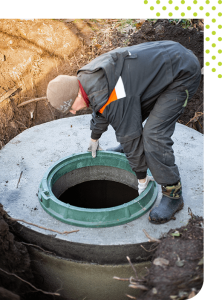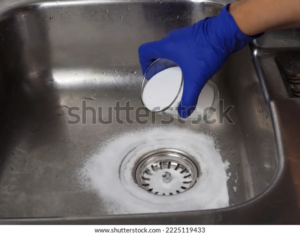Every time you flush the toilet, wash your clothes or take a shower, wastewater travels down your drain pipes and into your septic tank. Inside the tank, solid waste settles at the bottom while fats and grease drift to the top.
A septic tank’s partition wall keeps these fatty substances from passing into your absorption field where they could clog soil and drain lines. Click the https://www.septictankarmadale.com.au/ to learn more.

Wastewater leaves your house through a series of pipes to the septic tank, which is a buried, water-tight container made of concrete, fiberglass or polyethylene. The tank is divided into compartments to allow solid materials to settle down to the bottom forming a sludge layer and oil and grease to float to the top forming a scum layer. Compartments and a T-shaped outlet prevent the sludge and scum from leaving the tank and traveling through the drainfield area to clog it. Anaerobic decomposition within the septic tank breaks down organic solids and gases into liquid wastewater or effluent that exits the septic tank into the drainfield.
The septic system removes solids from the wastewater before it disperses into the soil, where the septic system’s soil absorption field (drain field) further filters and treats the water. Solids that are not removed from the sewage stream can clog and contaminate the drain field, leading to premature failure of the system.
Septic tanks require periodic pumping. Most systems will need to be pumped out every three to five years depending on usage and the amount of solid waste that is generated by your household. Regular septic tank cleaning and following safe disposal practices can reduce the stress placed on your septic system and extend the time between pumping.
Whenever you flush a drain or run your toilets, wastewater is discharged from the home into the septic system. Wastewater travels down a sewage pipe to the septic tank, which is usually located beneath the home. The septic tank is the first point of treatment for the sewage.
Once the sewage reaches the septic tank, it is separated into two components. Heavy solids sink to the bottom forming a sludge, while light solids and FOG float to the top forming a thick scum layer. The remaining wastewater that does not contain sludge or scum enters the second compartment where anaerobic bacteria begin to break down organic matter.
The bacterial decomposition of organic material produces large quantities of gases, including hydrogen sulfide, which smells like rotten eggs. A venting system, usually a mushroom-shaped structure on the lid of the septic tank, releases these gases to prevent the buildup of pressure that could block or reverse the flow of wastewater and cause a septic system failure.
Pumping
When wastewater leaves your house it flows to the septic tank, where solid wastes and the lighter scum layers separate from household wastewater. This is called primary treatment. The solids that are removed from the wastewater allow it to more easily flow through and be absorbed into the soil absorption field. This helps to protect the drainage system and prevent clogs from forming.
The septic tank has three main parts; the inlet chamber, the water layer, and the sludge layer. When waste enters the septic tank from your home it is pushed into the water layer by the baffle wall, and then it forms these three layers. The scum layer forms on top of the water layer and the sludge layer forms at the bottom of the tank.
Over time the scum and sludge will be broken down by bacteria inside the septic tank. This will cause the layer to shrink, and the liquid waste that was in the scum and sludge layers will rise and flow out of the septic tank. The septic tank must be pumped on a regular basis to remove the sludge and scum waste from it.
During the pumping process, someone will look for any damage to the septic tank and the overall septic system as well as check the tank for leaks and other issues. The technician will also listen and observe the septic tank as it is being pumped to make sure that all of the sludge and scum has been completely removed from the tank.
Ideally, a septic tank should be pumped about every five years. The frequency will vary depending on the size of your septic tank, the number of people living in your house, and what kind of waste is entering your home’s drains. It is important that non-biodegradable waste is not flushed down the toilet, and you should be careful to only use septic safe items like paper towels, napkins, and tampons. Avoiding things that say they are “flushable” like wipes and kitty litter will also help to reduce the amount of solid waste in your septic tank.
Installation
In a standard system, wastewater is stored in a septic tank. It is partially treated by bacteria and the lighter solids are broken down. Water is then dispersed into a drain field. Alternative systems can use tanks but also incorporate methods to further treat the wastewater and account for issues like poor soils or a high water table.
Before the installation of a septic tank, the site should be tested to ensure it will drain properly. The area should be large enough to accommodate the tank and any required pipes and have plenty of space away from buried structures, driveways, play areas, and other obstructions. In addition, it should be free of trees and shrubs with deep roots that could penetrate pipes.
The installation of a septic tank starts with excavation to dig a hole that is the correct size for the tank and any work needed around it. Once the hole is dug, it must be backfilled and graded correctly to prevent surface water and groundwater from flowing into the tank or drainage field. Risers are installed over the inlet and outlet of the tank, providing easy access for future repairs and maintenance.
After the installation of the septic tank, pipes are run to and from the house and to and from the drain field. The inlet and outlet pipes must be sealed to make sure the system is watertight. Before backfilling the tank, it is filled with water to check for any leaks. If no leaks occur, the tank is ready to be used.
A septic tank can be constructed of metal, fiberglass, or concrete. A concrete tank is less expensive than a fiberglass one but will require more frequent maintenance and repairs to keep it in good condition. Metal tanks are typically more durable but cost more to install and repair.
If you have a concrete septic tank, you might need to consider replacing it with a newer, more efficient system. Concrete septic tanks do not adequately retain waste and can cause wastewater to seep into the surrounding groundwater, contaminating nearby waterways and drinking water.
Maintenance
A septic tank should be pumped every two to five years, depending on the size of the tank and household usage. This will keep the septic system working efficiently and prevent sewage from backing up into toilets. Regular septic tank pumping will also extend the life of your drain field, which is buried in a trench outside the house and allows liquids to sieve through the soil.
Homeowners can do a few things to help protect their septic systems and reduce the need for septic tank pumping. For example, homeowners should only flush toilet paper and human waste into the tank. They should avoid flushing cotton balls, tampons, sanitary products, “flushable” wipes, and cigarette butts, which clog the septic tank and drainfield. It is also important to limit use of the garbage disposal, as food scraps and cooking grease can clog the septic tank and sewage lines.
If a septic tank is not pumped regularly, the solids will flow into the drainfield and clog the soil pores in the absorption field. Over time, this can lead to the septic system failing, which exposes the environment and people to disease-causing bacteria.
A well-maintained septic system can last 20 or more years. If the tank is not pumped frequently enough or there are other system failures, it may need to be replaced sooner than this.
When a septic tank is overloaded, the inlet pipe will flood and cause sewage to seep into the ground surface or back up into toilets. This exposes the environment and humans to disease-causing bacteria and clogs pipes, tanks, and drain fields.
Having the septic tank inspected and repaired on a schedule will prevent these problems. The septic tank should be inspected for leaks and cracks, and the baffles should be checked for wear. The septic tank should be pumped when the scum layer is within six inches of the bottom and the sludge layer is within 12 inches of the outlet. A septic tank should also be pumped if the sludge level is above 25% of the liquid level.
To reduce the need for septic tank pumping, homeowners should add 8 to 12-inches of mulch around the septic tank and pipes. This helps to insulate the soil and prevent frost damage during the winter. It is also helpful to divert downspouts and landscaping water – especially irrigation sprinklers – away from the septic tank and drain field.
